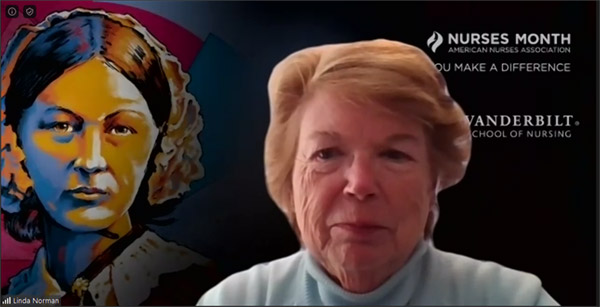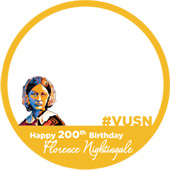Practices developed by Florence Nightingale are still relevant today, and in fact, are major weapons in the fight against COVID-19, says Vanderbilt University School of Nursing Dean Linda D. Norman, DSN, FAAN.
Norman, the Valere Potter Menefee Professor of Nursing, outlined Nightingale’s relevance in a video for VUSN students commemorating May 12, 2020, the 200th anniversary of Nightingale’s birth.
Dean Norman’s message:
2020 has been a monumental year for nurses—and not quite how we’d planned it. The world health organization designated 2020 as the “International Year of the Nurse and the Midwife” to recognize nurses and midwives, and the vital health care they provide worldwide.
It was set to correspond with the 200th anniversary of Florence Nightingale’s birth. Nursing organizations and schools planned commemorative events to recognize her as the founder of modern nursing. Many of these special celebrations were scheduled for May 12th, Florence’s birthday.
Then COVID-19 emerged. The world is now in a long, unprecedented life-and-death crisis. Schools, including Vanderbilt, moved all courses online. In-person events have been cancelled to prevent the spread of the coronavirus. Self-isolation and social distancing are now routine.
That means we are unable to be together this year to celebrate Florence Nightingale’s 200th birthday. I didn’t want the occasion to pass, however, without reflecting on her legacy, and sharing how her work is even now a key weapon in our fight against COVID-19.
The principles Florence Nightingale pioneered, first in the Crimean War, then in hospitals in England, form the bedrock of modern nursing. They are also the main defenses against COVID-19 infection.
When Florence Nightingale arrived in the Crimea, she found horribly unsanitary conditions in the hospital wards. Soldiers were dying of disease, not their wounds. She promoted hygiene as a weapon to fight infection. So she had the barracks moved. She insisted on frequent hand washing, sterile surfaces, infection control, and fresh air. Those are still the methods employed to prevent transmission of COVID-19.
One challenge in preventing COVID-19 infection has been finding sufficient personal protective equipment for nurses and other health care workers. People caring for persons with COVID are at high risk. Florence knew the danger nurses face from disease. Later in her career, she used statistics to demonstrate nurses had higher exposure to fever and cholera than civilians. She used those finding to demand hospitals improve protection of staff.
That spotlights another area where Florence Nightingale was a pioneer: epidemiology. She believed that good data was essential to decision-making and understanding. In 1858, she became the first woman inducted into the Royal Statistical Society.
Florence used infographics before it was a word. She created charts and diagrams to convey facts in her reports. We see this today. The CDC, experts, and media regularly use diagrams, pie charts, and graphs to communicate about COVID-19.
Florence was a social reformer. She considered social determinants of health long before the term was coined. She used data to understand how physical and social conditions impact health, and consistently called for better care for the poor. We have seen, unfortunately, that social determinants play a role in the current pandemic. The elderly, people of color and those with pre-existing conditions are at greater risk.
Florence Nightingale lived to be 90 and she saw many of her practices adopted in health care. Those practices still endure. They are essential in dealing with today’s COVID-19 pandemic.
Florence Nightingale was a pioneer in many areas and she transformed nursing into a science-based, respected profession. Nursing—and the world—would be different without her. My career and your careers would be different without her. For that and for so many other reasons, we celebrate her on her 200th birthday. Happy Birthday, Florence, and thank you.
VUSN activities:
International nursing institutions and schools had originally planned a variety of celebrations to commemorate Nightingale’s 200th birthday but social distancing and other COVID-19 challenges resulted in the cancellation or postponement of events.
VUSN had planned a variety of on-campus events for its students, faculty and staff that have been reorganized as online or virtual activities. These include:
- Norman’s video discussion of Nightingale’s practices of disinfection, staff protection and hand washing are the leading tools against contracting COVID-19. Norman also discusses Nightingale’s pioneering use of infographics and data to communicate needs.
 Free Zoom backgrounds that promote May as National Nurses Month, as declared and developed by the American Nurses Association. Choices include dark and light backgrounds, as well as backgrounds that carry the legend “Happy 200th Florence Nightingale.” Visit Zoom background gallery https://vusn.smugmug.com/Lightboxes/n-WSjJB/VUSN-Zoom-backgrounds/
Free Zoom backgrounds that promote May as National Nurses Month, as declared and developed by the American Nurses Association. Choices include dark and light backgrounds, as well as backgrounds that carry the legend “Happy 200th Florence Nightingale.” Visit Zoom background gallery https://vusn.smugmug.com/Lightboxes/n-WSjJB/VUSN-Zoom-backgrounds/
 Free Facebook photo frames that wish Florence Nightingale a happy 200th. They’re available to all Facebook users.
Free Facebook photo frames that wish Florence Nightingale a happy 200th. They’re available to all Facebook users.
-
- To add a Florence Nightingale frame to your Facebook profile picture:
- Go to Facebook and click your profile picture.
- Click Update. The next screen will say Upload photo or add frame.
- Click add frame. On the screen that says “Add a Frame to Your Profile Picture,” search in the bar on the left for Florence 200th Birthday or Florence 200th Birthday VUSN. (There are two—one with VUSN and one without.)
- Click Use as Profile Picture. You can also set how long you want that frame to be around your photo.
An informative and interesting website about Florence Nightingale is the Florence Nightingale Museum in London. Although currently closed due to the COVID-19 pandemic, the museum has a variety of online exhibits, including educational resources for children.
The painting used in Dean Norman’s video is titled ‘Florence Nightingale in the Military Hospital at Scutari’, 1855 (c). It is at the National Army Museum in London, and is a colored lithograph by and after Joseph Austin Benwell, published by Peter Jackson, The Caxton Press, London and Liverpool, 1856 (c). From the museum catalog: “In the night scene, Florence Nightingale is shown on her inspection rounds of the cramped wards of the hospital at Scutari during the Crimean War (1854-1856). In what was to become an iconic image of her, Miss Nightingale is seen holding a lamp in her hand.”